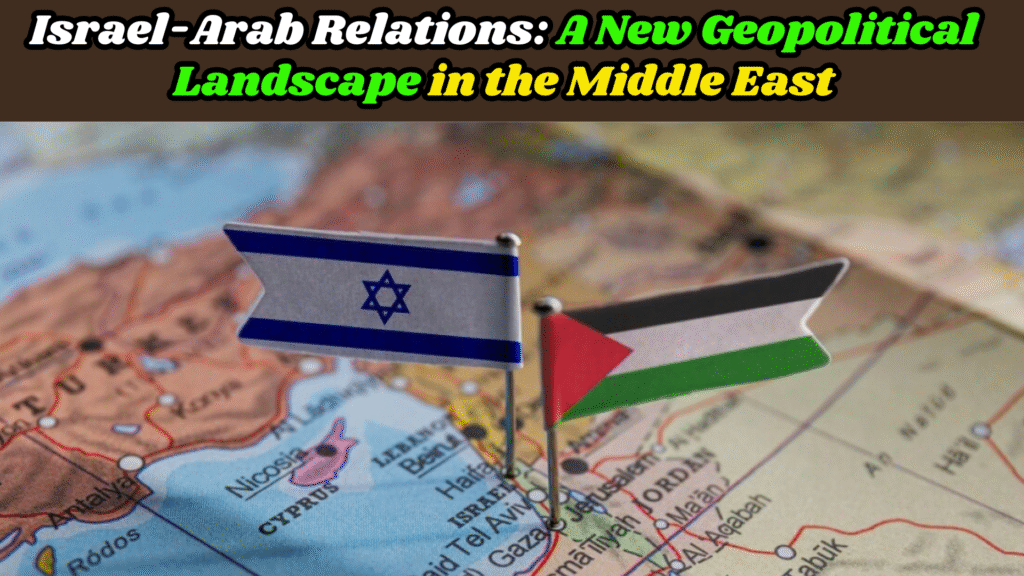
Israel-Arab Relations: In recent months, geopolitical instability has escalated in the Middle East, with Israel emerging as a new cause for concern among Muslim nations. Following recent Israeli attacks in Doha, calls for unity and solidarity have resonated across the Middle East. These attacks have not only raised questions about the protection of Palestinian territories but have also conveyed a renewed message of unity among Arab countries.
The United Arab Emirates (UAE), Qatar, Saudi Arabia, and other Gulf states have expressed deep concern regarding Israel’s policies and the potential annexation of the West Bank. This has led to a tendency for these countries to unite. However, the UAE’s intentions appear somewhat different, and its stance is not yet entirely clear.
United Arab Emirates’ Position:
So far, the United Arab Emirates has not decided to fully sever its diplomatic relations with Israel. Abu Dhabi has indicated that it might recall its ambassador and increase diplomatic pressure on Israel. However, it remains unclear whether they have the courage to take a step such as cutting all ties with Israel.
According to a Reuters report, Lana Nusseibeh, an official from the UAE Ministry of Foreign Affairs, told ‘The Times of Israel’ on September 3rd that any annexation of Palestine would be a “red line.” However, on Thursday evening, Gulf officials rejected Nusseibeh’s statement, though they did not mention her by name.
The United Arab Emirates is one of the few Arab countries that have diplomatic relations with Israel. The Abraham Accords, signed in 2020, are considered a major foreign policy achievement for US President Donald Trump and Israeli Prime Minister Benjamin Netanyahu. Bahrain and Morocco are two other countries that are partners in this agreement. So far, no other Arab country has established formal relations with Israel.
Israel already has diplomatic relations with Egypt and Jordan, and direct contact with Qatar, though without full diplomatic recognition.
Tensions and Consideration of Severing Relations:
As a sign of growing tension with Israel, Gulf countries decided last week that Israeli defense companies would not be allowed to participate in the Dubai Airshow, scheduled for November. An Israeli official and a defense industry executive confirmed this information. Israel’s Ministry of Defense stated that they had been informed of this decision but no further details were provided.
A spokesperson for the Israeli embassy in Abu Dhabi said that discussions about Israel’s participation were ongoing and that security reasons were cited in the official statement. However, Israeli officials say the real reason behind this is the Israeli airstrikes against Hamas’s top leadership in Qatar. Gulf countries have condemned these attacks and expressed solidarity with Qatar.
Future Direction of Relations:
A spokesperson for the Israeli Ambassador’s office said that Israel is fully committed to the Abraham Accords and will continue to work to strengthen relations with the United Arab Emirates. Since establishing relations in 2020, the UAE and Israel have focused on economic, security, and intelligence cooperation. Previously, these contacts had been secret for years. However, disagreements began to increase after Netanyahu’s return to power in 2023.
Abu Dhabi has condemned Israel’s continuous efforts at the Temple Mount/Al-Aqsa Mosque compound, where attempts are being made to allow Jewish prayer. This site is sacred to both Muslims and Jews, and currently, only non-Jews are permitted to visit. The United Arab Emirates has also criticized Israel’s policies in the West Bank and its military operation in Gaza in October 2023. Hamas has since killed more than 1,200 civilians in southern Israel.
Currently, it remains to be seen whether the existing relationship between the United Arab Emirates and Israel will endure amidst Israel’s ongoing attacks on Hamas and its ground operation in Gaza. The position of the United Arab Emirates remains enigmatic. It will be seen whether the United Arab Emirates will take a different path from other Muslim countries or maintain diplomatic relations with Israel.